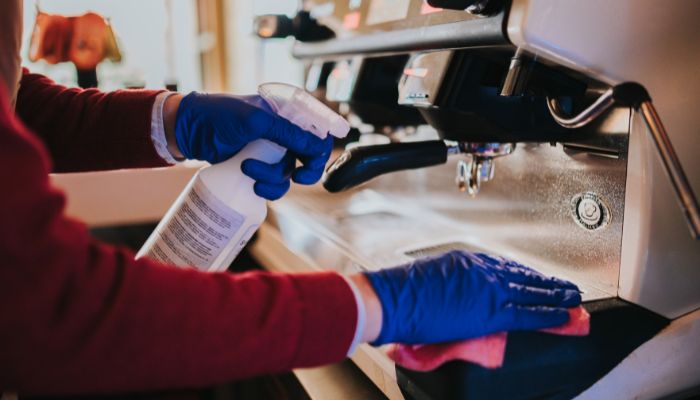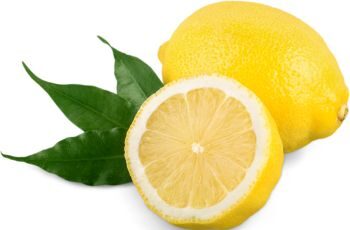The key to making consistently great coffee is to make sure your coffee machine is running properly. Since coffee machines constantly have warm water passing through them and sitting in them, there’s a good chance that undesirable substances can start to build up inside the machine.
Let’s talk about how to clean a coffee maker without vinegar.
How to clean a coffee maker without vinegar
Now that we’ve covered why you need to clean your coffee maker and why vinegar, although a potent cleaner, is a bad idea, let’s talk about some ways you can clean your coffee maker without vinegar.
The basic idea for descaling and cleaning is the same:
- Fill the water tank with a mixture of water and your chosen descaling solution
- Run a brew cycle two times to get the solution to flow through your machine
- Run a brew cycle with regular water two times to flush out the solution
1. Use the manufacturer’s descaling solution
Descaling solutions almost always contain acid, and acid is effective at both killing bacteria and removing limescale. The most effective way to clean a coffee maker is to just use the manufacturer’s descaling solution since they use an ideal ratio of acid to water.
When we make acids at home(like vinegar or citric acid) we may sometimes screw up the proportions, ending up with either a very weak or overly powerful acid. Both are not good – a weak acid won’t clean as well, and a strong acid will corrode the metal inside your machine. Whoops!
The downside of the manufacturer’s solutions is that it’s generally a lot more expensive than just household vinegar or acid. But if you have a $1000 espresso machine, you may as well spend $10-15 on a good descaling solution to keep it in good shape.
2. Use citric acid or lemon juice
Citric acid, the organic acid found in citrus fruits(including lemon juice), is a really good household cleaner. Interestingly enough, if you’ve ever eaten sour candies that have the white powder on them, the white powder is citric acid.
To make citric acid, you can buy crystals and dissolve them in water. Ratios vary, but people suggest 1 tablespoon for every gallon of water. A stronger solution would be 1 tablespoon for one liter or quart of water.
You don’t want something too strong, as you can always run the descaling cycle twice if it didn’t work properly in the first go.
If you can’t get your hands on citric acid, you can use lemon juice as well, but you’ll need to squeeze a lot of lemons to get enough lemon juice to add to water and not have the acid lose its potency.
The biggest advantages of lemon juice and citric acid are that they’re both potent at killing bacteria and removing limescale, and they’ll leave your coffee machine smelling nice and fresh, and it’s totally safe to ingest if a little bit of citric acid or lemon juice is left in your machine for whatever reason.
3. Use baking soda
Baking soda is another household chemical that’s very common and very multi-purpose. Mixing baking soda into water and running it through your coffee machine will disinfect it and remove odors. It is another good way to clean a coffee maker without vinegar, but it may not be quite as effective as an acid for removing limescale.
Pure baking soda will make the solution alkaline, which can kill of many bacteria, but alkaline substances will not remove limescale as effectively.
A combination of baking soda and vinegar(or any acid) is quite potent at removing limescale, though, since the acid will loosen the scale and the baking soda will scrub it away.
4. Use denture tabs
Denture tabs are dissolvable tablets that have disinfecting and deodorizing properties. While this seems like an unlikely solution, it does indeed work. It will effectively remove bacteria and leave your coffee machine smelling fresh, but it may not be as effective at combating limescale.
For that, you’ll need to use an acid. There’s no way around it.
5. Use Borax
Borax is another compound that will turn water alkaline, and it has the same effect as using denture tabs or baking soda. Mix a tablespoon of Borax with water and run it through your machine.
Why you need to clean your coffee maker often
Hard water and limescale
The water running through your household is rarely 100% pure water. Most of the time it will have some levels of minerals dissolved in it, and if you live in areas with hard water, there will be quite a large amount of minerals.
Most of the time, the minerals themselves are not bad for your health, but over time, they can be really bad for your appliances. Any time that water is even slightly stagnant in your appliances, it begins to slowly evaporate and leave deposits of minerals.
These mineral deposits reduce the flow of water, and they don’t conduct heat as well as metal, so your coffee machine performance decreases.
Additionally, they can affect the taste of your coffee too.
I once got a coffee machine out of the attic after a long time and I must have forgotten some water in it before storing it, so the entire tank was completely covered in limescale. Even 10 descaling cycles was not enough to get the limescale deposits out, sadly.
Bacteria and mold
More problematic than limescale is the growth of bacteria and mold. The warm, damp environment inside your coffee maker is a ripe breeding ground for all sorts of nasty bacteria which can seriously affect your health if you ingest them.
Even though hot water passes through the pipes, the water is not quite hot enough to kill the bacteria, nor does the water remain in contact with the pipes for enough time to do so effectively.
When you usually sterilize things by boiling them in water, you’d have to leave it in the water for at least 4 to 5 minutes to effectively sterilize.
Because of these reasons, you need an effective way to kill bacteria, mold, and remove limescale from your coffee machine.
Why you may want to clean your coffee maker without vinegar
Vinegar is a household staple, it’s cheap, and is super effective at killing bacteria and removing limescale. Even then, there are two big reasons you may want to avoid using vinegar to clean your coffee maker.
1. Vinegar can react with the rubber parts in your coffee machine
The pipes in your coffee machine are not all metal – occasionally, some water or milk may move through a rubber tube, and repeatedly descaling with vinegar can result in the rubber slowly wearing away. For whatever reason, vinegar seems to react more potently with the rubber tubing than other acid cleaners.
2. Vinegar can leave a strong smell
If you’ve ever taken a whiff of vinegar, you know that vinegar has a very strong, pungent smell. If you descale your coffee machine with vinegar, you may not be able to completely remove the pungent odor that comes with it.
If the odor doesn’t go away completely, it may affect your coffee, too. Let’s be honest, half of the enjoyment of coffee is about the wonderful aroma!
French presses and Hario-style drippers can be cleaned by hand
It’s worthwhile to note here that most of the solutions we’re talking about deal with coffee machines and espresso machines that have internal pipes.
If you brew your coffee using a manual dripper or a french press, or even an Aeropress, then simply cleaning with dish soap by hand will do the trick.
How to clean espresso machines and drip brewers
To clean espresso machines and drip brewers, you’ll need to follow the manufacturers instructions. Most of the time, you can just add a mix of the acid and water into the water tank and run a few brewing cycles. Some coffee machines have a dedicated “clean” function, though, so if yours has it, it’s best to use that.






